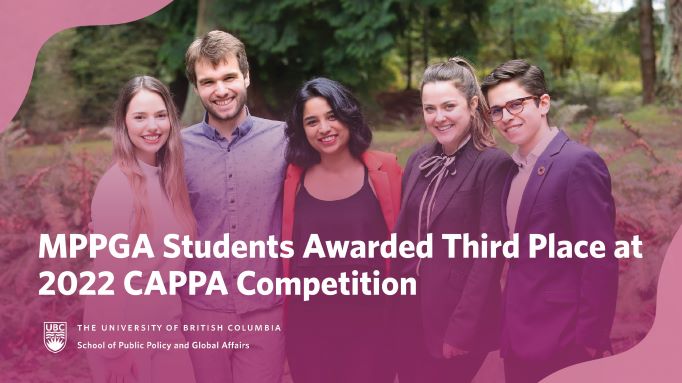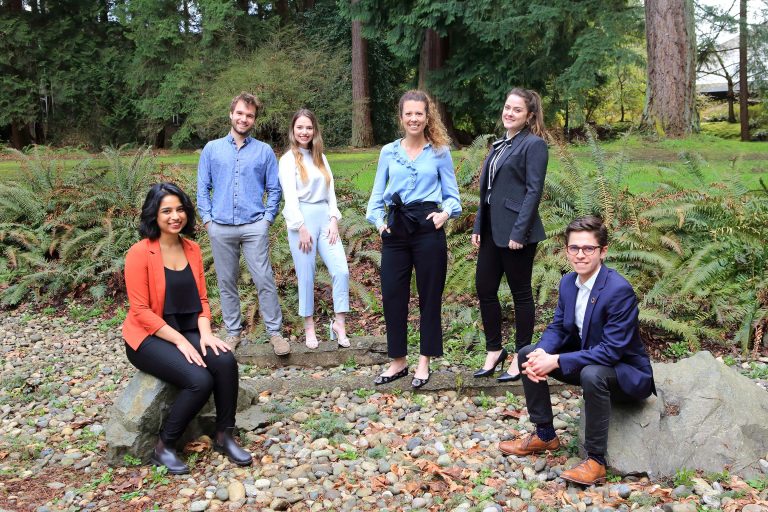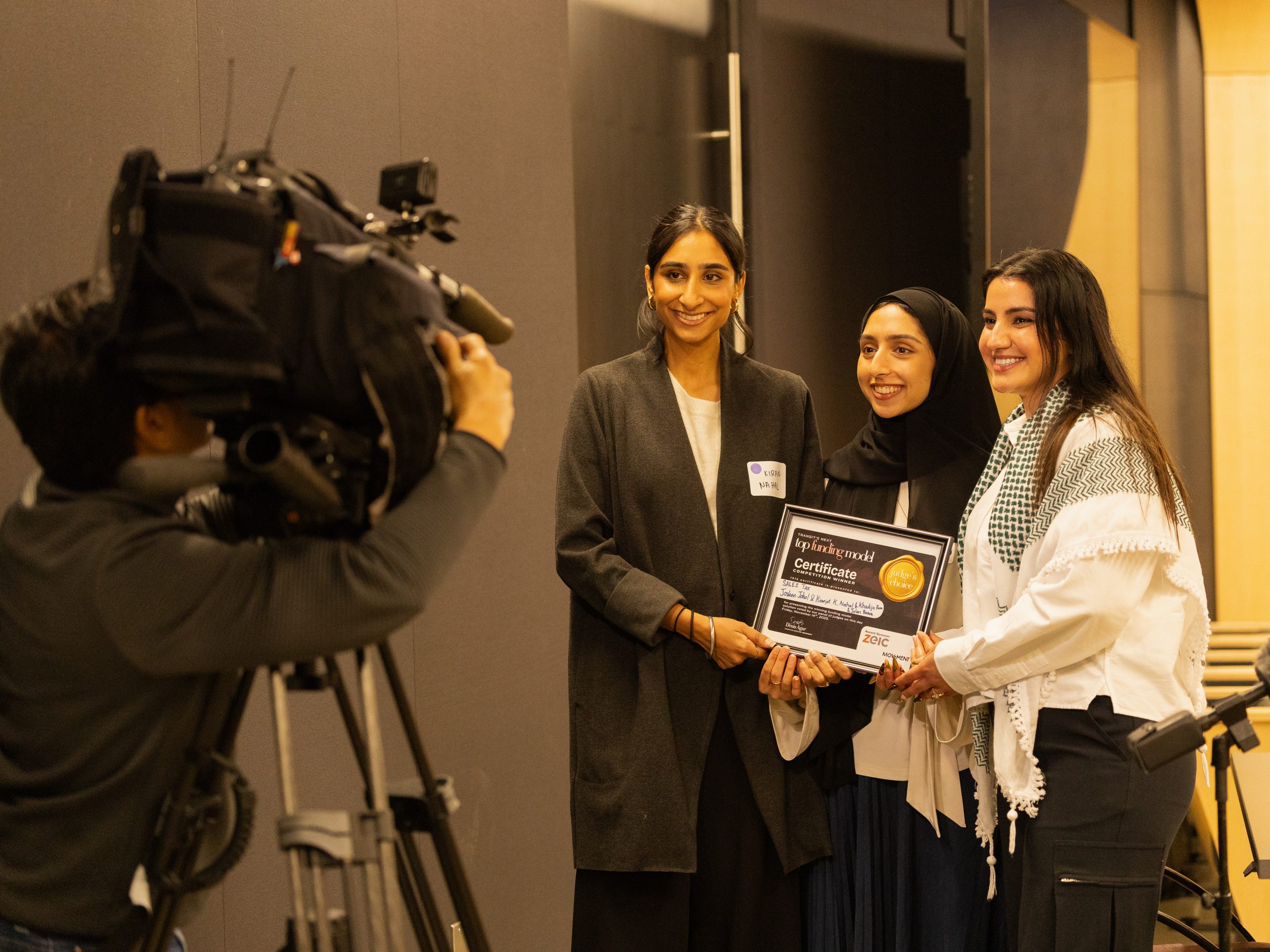

University of British Columbia Master of Public Policy and Global Affairs (MPPGA) students recently won bronze at the 11th Annual National Public Administration Case Competition held on February 26, 2022. In this year’s competition, teams worked on the case study, A Wicked Problem: Rough Sleeping in Cities.
This year, the National Annual Public Administration Case Competition (the “CAPPA” competition), hosted by the Institute of Public Administration of Canada and Canadian Association of Programs in Public Administration (CAPPA) invited 14 teams of students from across the country to prepare and present a policy briefing, based on a real-world issue, to a panel of judges.
Our team, Clara Renault, Darby Walton, Nicolas Côté, Oliver Boucher, and Rutu Patel, were selected by the UBC School of Public Policy and Global Affairs (SPPGA) to represent UBC at a national level with the help of coach Dr. Tara Cookson.
SPPGA Assistant Professor Tara Cookson said: “Throughout the course of training for this competition, the students consistently impressed me with their strategic and creative thinking about challenging policy problems, as well as the professional and thoughtful way they operated as a team. They built one another up and committed to collaboration even while under pressure and when they held opposing views. And the judges recognized them for demonstrating these kinds of skills that are necessary to do ‘real world’ policy work. I couldn’t be more proud of them!”


Caption (L-R): Rutu Patel, Nicolas Côté, Darby Walton, Professor Tara Cookson, Clara Renault, and Oliver Boucher at UBC SPPGA
The Case Challenge
The growth of homeless encampments and “rough sleeping” is a vexing problem affecting communities across Canada, especially during Covid-19. Through our research, our team came to appreciate that myriad, complex challenges lead people to sleep in encampments. Because all three orders of governments and civil society play a role in the larger issue of homelessness, rough sleepers must navigate a maze of social services and housing supports. Static and outdated data compound these problems—statistics are collected at one point in time each year and recent counts have been delayed due to Covid-19. Our team was tasked with devising a solution for the province of BC.
The Federal Government’s strategy to address chronic homelessness, Reaching Home, requires that designated communities integrate this maze of services into a single system called Coordinated Access by April 2022, though it is not yet operational (see Figure 1). Under Coordinated Access, service delivery organizations collect real-time, by-name data on a consensual basis and use a standardized assessment tool to more effectively match individuals experiencing homelessness with appropriate housing and services. Medicine Hat, Alberta became the first city in Canada to end chronic homelessness through this approach.


Figure 1: Current service provision maze, and the coordinated access proposal. Produced by Huron County, Heart to Home
Our Solution
Presenting to the BC Premier and Senior Cabinet Officials, we recommended that the eight designated community entities across BC funded by Reaching Home, such as the Vancity Foundation, deploy Coordinated Access in homeless encampments. Designated communities would run a one-year pilot in one encampment in their region to gather an initial set of data, build trust with the residents, and show that the system accurately assesses and responds to residents’ needs before scaling to all encampments. As rough sleepers’ needs are met through appropriate and enduring services and housing, encampments would become obsolete and cease to exist, creating safe and healthy communities for all.
Reflections
We are grateful to our coach Tara Cookson for guiding us through a series of intensive, time-bound practice cases on a wide range of issues where we had to work together and sharpen our skills under pressure. With the help of Tara’s coaching, our team learned how to carry a strong narrative throughout the presentation, integrate quantitative and qualitative research elements, thoroughly analyze a problem and provide clear and realistic recommendation and implementation options. We also learned to leverage one another’s strengths and push one another toward having our best presentation at competition.
Oliver: “CAPPA taught me how to reconcile perspectives on complex problems, present my reasoning tactfully, and have a ton of fun while doing it. I’m grateful to my dedicated colleagues, our wonderful coach, and the organizers for the opportunity!”
Darby: “Participating in the CAPPA competition was an amazing opportunity to leverage my previous case competition experience in a policy context. Throughout this experience, I had the distinct privilege of working with a team of individuals that pushed me to think through policy options more critically, design the best possible presentation to convey our ideas, and prioritize having fun and sharing laughs along the way”.
Nicolas: “Participating in the 2022 CAPPA competition was like an accelerated course on how policy work happens. We learned how to, in one-week stretches, get a clear picture of a problem, propose workable solutions along with an implementation plan, and present them to a panel of deciders. It was an invaluable experience for a future career in policy. The rest of the team was also so sharp, compassionate, and committed, that it was simply a highlight of my year to gather and solve problems together.”
Clara: “For me, participating in CAPPA was an experience that allowed me to apply several concepts that we learned in the courses, as well as to exercise my oratory, analysis and teamwork skills. Training for two months for a national competition was intense, challenging, but it was an excellent way to understand our own work capacity.
In addition, we had the opportunity to create a bond between the participants and our coach that we might not have had without the competition. I am very grateful for this opportunity, and I definitely recommend the experience.”
Rutu: “Being part of the CAPPA team was such a rewarding experience! It was challenging, educational and fun. The greatest lesson I learned was how to communicate complex policy issues and solutions effectively. With the coaching from Tara, I feel my policy analysis and presentation skills have improved significantly. The Bronze win was just a cherry on top! I am abundantly grateful to our stellar team for the wonderful experience!”


